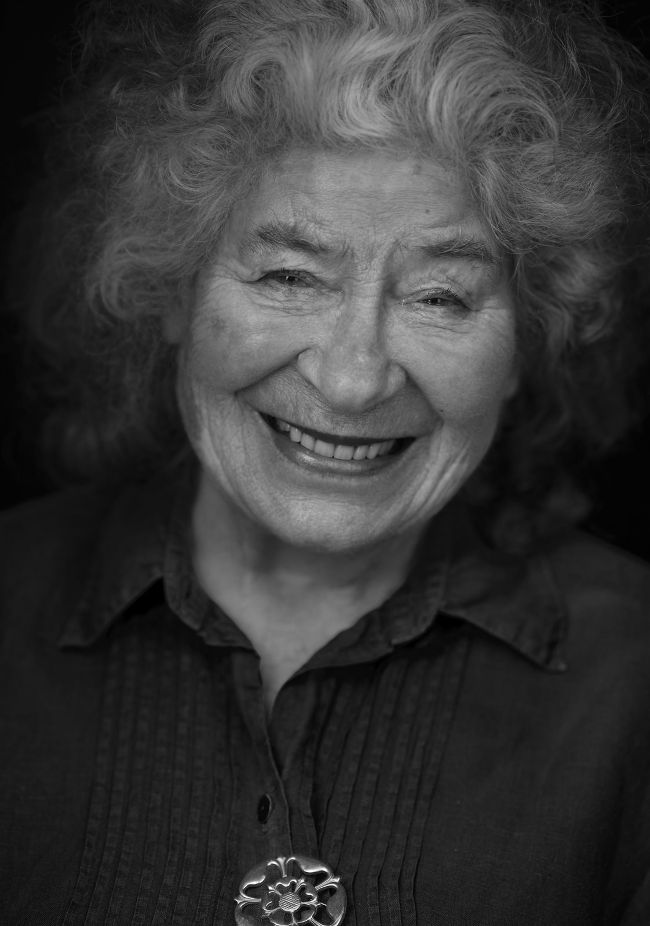THE MOJO INTERVIEW
Pugnacious pioneer of the folk revival ’til her voice faltered, she returned to carry its torch. But if her new LP is really her swan song, what wisdom does she pass on? “You just sing the song for its own sake,” says Shirley Collins.
Interview by JIM WIRTH

Portrait by TOM OLDHAM
‘‘LIPSTICK ON, CUP OF TEA,” SAYS Shirley Collins, doing her final checks as she settles down to talk to MOJO. At 87, the empress of British folk is pretty certain that her new album, Archangel Hill – her third since she ended a 38-year exile from music – will also be her last. However, as she sits in her modest house in Lewes, with long-time friend and arranger Ian Kearey providing moral support, it is hard to imagine British traditional music carrying on without her.
Born in Hastings, and raised in a stoutly left-wing working-class household (her uncle, F.C. Ball, was the biographer of The Ragged- Trousered Philanthropists novelist Robert Tressell), Collins began performing during the ’50s and ’60s folk revival, making a number of records of English songs and playing alongside future scene nemeses Ewan MacColl and Peggy Seeger in a hand-knitted supergroup, The Ramblers.
In 1959, she accompanied Alan Lomax on a field recording tour of America, discovering blues singer Mississippi Fred McDowell, among others, but arguably made more significant music of her own. She teamed with guitar maestro Davey Graham for 1964’s genre-warping Folk Roots, New Routes, then spectacularly reframed English song with sister Dolly Collins on The Sweet Primeroses (1967), The Power Of The True Love Knot (1968), the rhapsodic Anthems In Eden (1969) and the bleak Love, Death And The Lady (1970).
After divorcing her first husband, designer Austin John Marshall, she linked up with Fairport Convention bassist Ashley Hutchings, with whom she made a folk rock tour de force, 1971’s No Roses. She continued to record with Dolly – Adieu To Old England (1974), For As Many As Will (1978) – and The Albion Band, but lost her singing voice in the wake of a traumatic split from Hutchings.
She spent the subsequent decades in various employments – at the British Museum, running an Oxfam shop, behind the counter at the Job Centre – before being persuaded to record again. If the extraordinary high, raw voice that defined her early works has dipped an octave, Collins remains an unparalleled interpreter, staying absolutely true to her guiding ethos. “You just sing the songs as honestly as you can because that’s what they are and they hold up,” she explains. “If you try anything else, you sort of destroy it.”
With MOJO, she plays it similarly straight. While not exactly frail, she is somewhat shaken by a fall at home last year that led to a spell in hospital. “My hair turned white about a month later,” she explains. “So I’m not going to bother to dye it again. I can’t be arsed now.”
Her passion for life and music burn bright, though, as she explains how her stubborn commitment to her vision made her enemies in the factional bearpit of folk. Lipstick on, cup of tea. It’s going to be intense.
After 38 years of not recording, are you into a rhythm now?
We recorded [2016 comeback album] Lodestar here; we recorded the second one, Heart’s
Ease, in the studio and then this third one in the same studio in Brighton. There were complications recording Lodestar at home; Ian would be outside directing the traffic: “Can you just stop? We’re recording something!” It was just incredible to be singing again and making music and thinking about the songs.
Archangel Hill is more wistful because I realise it’s the last album I’ll make. I love the thought of three for Domino, I’m very happy with that. And at my age, you can’t keep… Well, perhaps you can. I mean, who knows? But certainly in my mind, this is the final one.